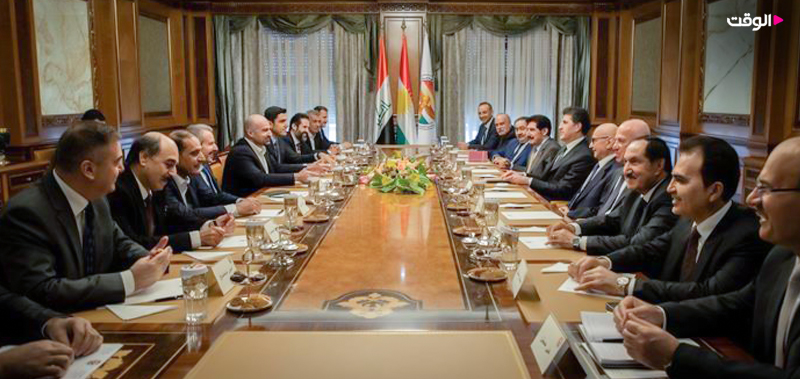Alwaght- After months of inter-Kurdish political tensions over Iraq president post, the two main Kurdish parties started moves in the past few days to settle the differences and possibly name a common candidate.
Nechirvan Barzani, the president of the Iraqi Kurdistan region on May 23 visited Sulaymaniyah, the bastion of the rival Patriotic Union of Kurdistan (PUK), and met with the party's chief Bafel Talabani, the Secretary-General of Kurdistan Islamic Union Salahuddin Bahauddin, former leader of Gorran Movement Omar Sayed Ali, and the head of Kurdistan Islamic Movement Ali Bapir.
Also, on Wednesday, the members of the political offices of two parties held a meeting in Erbil to discuss differences over the post of president. These moves mark a possible step by the Kurds towards a deal on a joint nominee to take over the presidency in Baghdad and de-escalate the tensions between the two parties that followed the October parliamentary elections. However, there are two important points about the possibility of an agreement between the two main parties in the Iraqi Kurdistan and its possible effects on Iraqi politics.
Kurdistan Democratic Party and the riddle of breaking the traditional principle of power distribution
In all the governments formed post-Saddam, the Kurds have held the presidency according to popular political tradition. In 2006 and 2010, Jalal Talabani was elected president without any serious obstacles and according to a strategic agreement between the two Kurdish parties. In 2014, Fouad Masum, of PUK, was elected president also in line with the agreement, but in 2018, after Talabani's death, a great duel took place between the two sides, which, after a great political controversy, finally ended with Barham Ahmad Saleh winning the majority vote to take the post.
But the beginning of the new duel took place after the October 10, 2021 elections. By entering a coalition with the victorious Sadrist Movement, the KDP made sure it would this time seize the post of president. But a Federal Court's ruling on February 3 according to which the parliamentary session for election of president required presence of at least two-thirds of the lawmakers practically left the KDP project to break the tradition of power distribution face to face with a big obstacle.
The KDP nominated Hoshyar Zebari, a member of its leadership and the former foreign minister and minister of finance, as its candidate to run against PUK candidate Barham Ahmed Salih. However, on November 7 and 8, an attempt by National Salvation coalition, an alliance comprised of Sadrist Movement, the KDP, and the Sunni Sovereignty bloc, to elect its nominee as the new president was delayed as the session did not reach the quorum. Shortly later, the Federal Court ruled Zebari nomination illegal, dealing a big blow to the KDP push for president post.
The KDP then nominated Rebar Ahmed Khaled, a member of the party's leadership and current interior minister of Kurdistan Regional Government (KRG), for the post. However, the party failed to convene a parliamentary session with its allies to elect a new president.
With limbo in Iraq prevailing and the rivals not reaching an agreement on a new government, idea of early elections has been raised recently in media and political circles. It is in such situation that the KDP is showing flexibility and talks a solution with the PUK.
Possible hypotheses on a probable Kurdish deal
At present, there are two hypotheses about the negotiations between the two parties. The first hypothesis is that the two parties will not reach an agreement in the end and we will see the crisis continue. Such a scenario would mean the continuation of the current situation and the escalation of the crisis in a broader sense.
The second hypothesis is that the two parties would agree on the extension of the presidency of Barham Salih or the selection of a new candidate agreed upon by both parties. But such a situation will not mean a guarantee of departure from crisis basically because the state suspension in formation of the new cabinet has become a matter beyond the will of the Kurdish parties. Presently, there are two power poles in the Iraqi political scene. On the one side stands the Sadrist-led coalition and on the other hand stands the Shiite Coordination Framework (SCF) that insists on an inclusive government.
It is noteworthy that each of the KDP and PUK are allied to the opposite sides. Now the question is whether the PUK would abandon its current coalition and coalesce with the rival alliance to realize the necessary quorum in case of an agreement with the KDP. Such an outlook would mean its entry to Muqtada al-Sadr's coalition.
Such a scenario is possible on the paper, but given the political equations, the way of PUK's alliance with the all-Shiite SCF, and also al-Sadr's insistence on a government without SCF allies, it is highly unlikely, even in case of an agreement between the Kurdish sides, the obstacles blocking president and prime minister elections would be removed. Essentially, as ever, the only way out of the political crisis in Iraq is a national unity government.



























